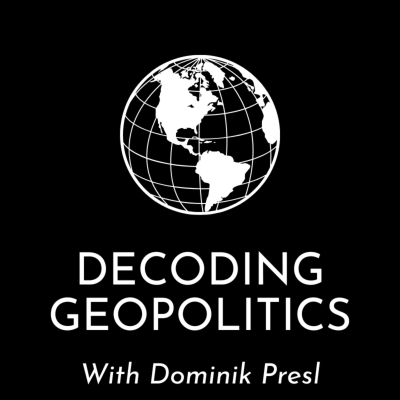
Decoding Geopolitics Podcast with Dominik Presl
engelsk
Nyheder & politik
Begrænset tilbud
3 måneder kun 9 kr.
Derefter 99 kr. / månedOpsig når som helst.
- 20 lydbogstimer pr. måned
- Podcasts kun på Podimo
- Gratis podcasts
Læs mere Decoding Geopolitics Podcast with Dominik Presl
Decoding Geopolitics is a podcast that tries to make sense of today's dangerous world by talking with real experts on international relations, strategy and security.
Alle episoder
121 episoder#109 James D. Boys: Trump's Controversial Strategy That Explains His Craziest Foreign Policy Decisions
➡️ Watch the full interview ad-free, join a community of geopolitics enthusiasts and gain access to exclusive content on PATREON: https://www.patreon.com/DecodingGeopolitics ➡️ Sign up to my free geopolitics newsletter: https://stationzero.substack.com/ This is a conversation with James D Lindsay, a Research Fellow at University College London and an author of a book on what’s called a Madman theory - a foreign policy strategy in which a leader attempts to present himself as completely irrational and willing to inflict great damage on themselves and the others in order to improve their negotiating position and create fear around possible escalation - even if in reality, they are actually a lot more restrained and not as mad as it may seem. The pioneer of this theory was Richord Nixon but the person who is often speculated to truly master the theory is Donald Trump - although there is a big debate over whether he is playing a madman to get what he wants - or whether that’s just really who he is. With James we talk about how Nixon tried and failed to use this strategy and pioneering this approach but we mostly focus on Donald Trump - about his first term and threatening North Korea with fire and fury, assassinating the Iranian general Qaseem Soleimani and threatening to leave NATO and his second term and his tariff war and attempt for Greenland takeover. To be honest, I don’t actually agree with most of James’s conclusions. I’m not nearly as sure that Donald Trump is just playing a madman and that it’s all part of a rational, negotiating tactic as he is - I can think it could just as well be a genuine chaos and irrationality. And even if it is a rational strategy, I really don’t think that it has been nearly as successful as James argues, especially in Trump’s second term. And that - whether it is a rational strategy or not - it causes more damage to US interests than it helps them. And so in the podcast, we disagree and argue about both of those things. But nevertheless, I do think that the theory and the concept, the arguments and this whole conversation is really interesting.
#108 Dalibor Rohac: Europe Doesn’t Trust America Anymore - And It’s Bigger Than Trump
➡️ Watch the full interview ad-free, join a community of geopolitics enthusiasts and gain access to exclusive content on PATREON: https://www.patreon.com/DecodingGeopolitics ➡️ Sign up to my free geopolitics newsletter: https://stationzero.substack.com/ This is a conversation with Dalibor Rohac - a senior fellow at the American Enterprise Institute, a long-time observer of European and transatlantic politics, and someone who is living intellectually and professionally between the United States and Europe. He’s originally from Europe, specifically Slovakia but he has worked in Washington for well over a decade - and so he has a unique view into a relationship in which the two sides are increasingly failing to understand each other. We recorded this a few days after the Munich Security Conference, where this year the crisis in transatlantic relations became by far the most dominant topic even as we have the war in Ukraine still going on right here in Europe. And so we talk about what did the conference tell us about where we are - what was the point of Marco Rubio’s speech and his visit to Hungary right after, why did Europeans give him a standing ovation and whether Europe now believes that everything is fine again - or to what extent does it actually even matter what the US Secretary of State says in an administration where everything is decided by Donald Trump anyway. And we take a step back and talk about the bigger picture as well - whether Donald Trump is more a historical aberration and in 2028 everything will go back to normal or whether he is the start of a bigger systemic change in America - and why this question is fundamentally important to Europe and the rest of the democratic world. About whether the US is now trying to dismantle the European Union and how Europe should react or about the fundamental contradictions at the center of US foreign policy - and much more.
#107 John Foreman: Russia’s Military Is Not What You Think
➡️ Watch the full interview ad-free, join a community of geopolitics enthusiasts and gain access to exclusive content on PATREON: https://www.patreon.com/DecodingGeopolitics ➡️ Sign up to my free geopolitics newsletter: https://stationzero.substack.com/ This is a conversation with John Foreman - someone with a fairly unique background to talk to on the Russian war in Ukraine. John spent several decades as an officer in the British military but more importantly he served as the British defence attache first in Kyiv and then in Moscow where he witnessed Russia first preparing and then launching the war in 2022 up close - both of which gives him a unique insight into both the Ukrainian and Russian military, political strategic thinking - and in this conversation we talk about all of that. We talk about what have the four years of war actually done to the Russian military. Is it broken? Is it adapting? Is it hollowed out and beaten down by the years of war - or is it battle hardened with unique combat experience and more dangerous than before? And then we move to the underlying question of where is this war going: whether the current Ukraine negotiations are actually leading anywhere or are they are simply diplomatic theater, what is the fundamental flaw at the center of Trump’s approach to the negotiations, and whether Moscow is - with increasing casualties and economic pressure - starting to actually look for a deal or whether it’s just pretending and dragging out the negotiations indefinitely.
#106 Max Bergmann: Something Finally Broke Between the U.S. and Europe
➡️ Watch the full interview ad-free, join a community of geopolitics enthusiasts and gain access to exclusive content on PATREON: https://www.patreon.com/DecodingGeopolitics ➡️ Sign up to my free geopolitics newsletter: https://stationzero.substack.com/ This is a conversation with Max Bergmann, the director of the Europe, Russia, and Eurasia Program at the Washington-based Center for Strategic and International Studies and an excellent analyst of transatlantic relations and European security - both of which are undergoing some pretty fundamental shifts. We talk about Greenland and why Trump’s attempt to annex it will be remembered as the beginning of a historic rift between Europe and the United States, why do MAGA Republicans seem to have so much vitriol against Europe and insult and berate it at every opportunity they have, about what should be Europe’s takeaway from this whole episode or about if after all this has happened, does NATO now only exist on paper - and if in practice, it isn't already dead. And about the concrete things that Europe needs to do to get ready to defend itself without the U.S. - and about the historic and completely transformational shift in European security and politics that’s still largely ignored - but that is now already happening.
#105 Yun Sun: Something Has Changed in Beijing. Xi Believes Now Is His Final Chance on Taiwan
➡️ Watch the full interview ad-free, join a community of geopolitics enthusiasts and gain access to exclusive content on PATREON: https://www.patreon.com/DecodingGeopolitics ➡️ Sign up to my free geopolitics newsletter: https://stationzero.substack.com/ This is a conversation with Dr. Yun Sun, a Senior Fellow and Director of the China Program at the Stimson Center. Yun is one of the most experienced China watchers and researchers, analyzing China’s foreign and domestic politics for over two decades which makes this conversation and her arguments both extremely interesting and kind of concerning. Because Yun argues that we are gravely under-estimating the risk of a Chinese invasion of Taiwan - not in some distant future but as soon as this year, 2026. She believes that the thinking in Beijing among China’s leadership is quickly changing: that they are abandoning the idea that time is on their side and that instead, China now believes that if it ever wants to get Taiwan, it’s now or never and the longer it waits, the harder it will get. And that we are now witnessing a confluence of several dynamics - none of which were likely or expected - but that are now all happening at the same time. And that together they are - as Yun Sun puts it - creating a “perfect storm for Taiwan in 2026” - and significantly increasing the odds that China might make its move. In this conversation, we talk about what these factors are - from the US foreign policy and China’s perception of Donald Trump to the Ukraine war - how likely a Chinese invasion this year is or what the recent purges of the leadership of the Chinese military - and the fact that Xi Jinping now has direct, unlimited command of China’s armed forces - mean in this context.
Vælg dit abonnement
Begrænset tilbud
Premium
20 timers lydbøger
Podcasts kun på Podimo
Gratis podcasts
Opsig når som helst
3 måneder kun 9 kr.
Derefter 99 kr. / måned
Premium Plus
100 timers lydbøger
Podcasts kun på Podimo
Gratis podcasts
Opsig når som helst
Prøv gratis i 7 dage
Derefter 129 kr. / måned
3 måneder kun 9 kr. Derefter 99 kr. / måned. Opsig når som helst.















































